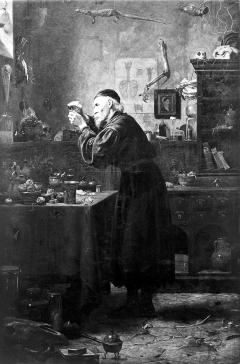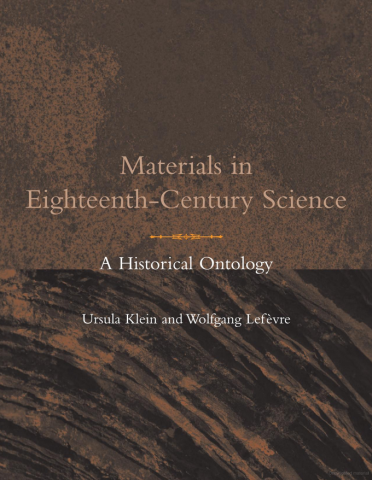In the past two decades, historical studies of the relations between the experimental and observational sciences and the arts and crafts in the early modern period have placed instruments at the forefront of historical inquiry. Such studies, as well as more general accounts of the reconfiguration of learned knowledge and practice during the early modern period, have demonstrated the extent to which the generation of learned natural knowledge crucially depended on instruments understood as resources constructed out of, and working upon, wider society. This project shifted attention towards new kinds of material objects: natural raw materials and substances processed in the workshop and laboratory. In the early modern period, metals, salts, acids, dyestuffs, gunpowder, alcoholic beverages, ceramics, glass, soap, animal and vegetable remedies, and so on were simultaneously commodities and objects of scientific inquiry. Like clocks, telescopes, and balances, these materials bridged the artisanal and the academic worlds. As they were objects shared by artisans and savants, they had many different significances and uses, according to how they were deployed in different practical or epistemic contexts. Traveling from sites of commercial production and consumption to academic institutions, and vice versa, they spurred the generation of both learned and technical knowledge.
For example, vegetable materials extracted from plants, such as gums, resins, and balsams, were commodities of the apothecary trade, often imported from foreign countries. Seventeenth and eighteenth-century apothecaries sold these materials as raw materia medica or used them as ingredients in older Galenic compounds and newer chemical remedies. As chemical remedies were products of chemical operations, academic chemists also studied these materials. In eighteenth-century chemical teaching and experimenting, these materials were explored on the one hand as remedies, with the aim of enhancing their pharmaceutical virtues, and on the other hand as natural bodies that provided information about the composition and economy of plants. Chemists’ analyses of plant materials thus often pursued the dual goal of contributing to learned and artisanal knowledge.
Focusing on materials, the project further moved from institutions and activities that have been unambiguously viewed as typical of “experimental philosophy,” thus as foundational to modern scientific inquiry, towards sites in which the practice of the arts and crafts intersected with many different types of learned culture. This dual shift broadens our notion of material culture by taking materials seriously as the subject of historical knowledge, but also suggests some revisions to the standard historical picture of the emergence of the natural sciences. A viewpoint still powerful within the field of history of science, which situates experimental philosophy and the history of physics at the center of attention, is here replaced by a decentered approach that takes into account a broader range of forms of making and knowing in the early modern period, including natural history, chemistry, pharmacy, and medicine. All of these latter cultures resist a clear categorization under the rubric of experimental philosophy. By analyzing the making, uses, and meanings of materials between 1600 and 1800, the project examined how different cultures of natural history, experimental history (historia experimentalis), and experimental philosophy intersected both with artisanal labor and craftsmanship and with everyday practices of commerce and consumption.
- Book project (Ursula Klein, in collaboration with Wolfgang Lefèvre): Shifting Ontologies: Materials in Eighteenth-Century Science. The book interweaves three historical and philosophical themes: the ontology of materials, modes of classifying materials, and the science of materials from the late seventeenth century until the early nineteenth century. In so doing, it presents a novel approach to the history of technological and scientific objects in general, and the history of chemistry in particular.
- Workshops and edited book project (Ursula Klein in collaboration with Emma Spary, Department of History and Philosophy of Science, Cambridge): The Making of Materials: Science and Technology in the Early Modern Period (1500–1800). The book project, based on two workshops, brings together the contributions of 14 well-known scholars working on different aspects of the relations between sciences and arts in the production of material substances in the early modern period. The materials studied in the volume have one outstanding feature in common: all of them were materials that were applied (produced and consumed) in the everyday world and in the world of the arts and crafts, while at the same time being objects of scientific inquiry.
- Workshops and edited book (with Carsten Reinhard, University of Bielefeld). Objects of Chemical Inquiry. Sagamore Beach: Watson Publishing International, 2014.


